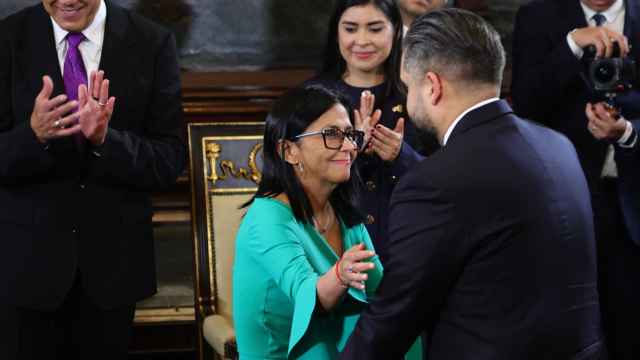LONDON — The widow of a former Kremlin agent killed by radioactive poisoning plans to boycott an inquest unless the British government holds a public inquiry examining alleged Russian involvement in her husband's death, her lawyer said.
Lawyer Ben Emmerson told a pre-inquest hearing Tuesday that Marina Litvinenko "will consider herself unable to continue in the inquest process as an interested party" if the government refuses.
Alexander Litvinenko, an intelligence agent-turned-Kremlin critic, died in London in 2006 after drinking tea laced with the radioactive isotope polonium-210. Lawyers for his family say that at the time of his death he was working for Britain's intelligence services, and that the Kremlin ordered his killing.
Britain accuses two Russians of the killing, but Moscow refuses to extradite them.
The British government has urged a coroner's inquest to withhold sensitive evidence relating to Russia's alleged role in Litvinenko's death and to whether the killing could have been prevented, citing national security concerns.
In Britain, inquests are held — in public — to determine the facts whenever someone dies violently, unexpectedly or in disputed circumstances.
After months of legal wrangling, coroner Robert Owen said the secrecy restrictions meant that his inquest would be effectively powerless to determine what happened to Litvinenko.
Last week, he said a government-ordered inquiry — at which the secret evidence could be heard behind closed doors if need be — was now the best option for finding out the truth about the death.
Marina Litvinenko and a group of British media companies have backed his call for an inquiry. The government said it would consider the request.
Emmerson said the inquest process should be suspended until the government announces its decision.
"We are at a loss to see a good-faith reason to prevent a hearing which could get at the truth from going ahead," he said.
The hearing was adjourned to an unspecified date.
A Message from The Moscow Times:
Dear readers,
We are facing unprecedented challenges. Russia's Prosecutor General's Office has designated The Moscow Times as an "undesirable" organization, criminalizing our work and putting our staff at risk of prosecution. This follows our earlier unjust labeling as a "foreign agent."
These actions are direct attempts to silence independent journalism in Russia. The authorities claim our work "discredits the decisions of the Russian leadership." We see things differently: we strive to provide accurate, unbiased reporting on Russia.
We, the journalists of The Moscow Times, refuse to be silenced. But to continue our work, we need your help.
Your support, no matter how small, makes a world of difference. If you can, please support us monthly starting from just $2. It's quick to set up, and every contribution makes a significant impact.
By supporting The Moscow Times, you're defending open, independent journalism in the face of repression. Thank you for standing with us.
Remind me later.





